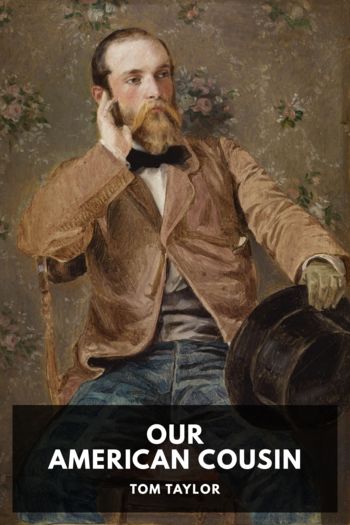Struggles and Triumphs, P. T. Barnum [good books to read in english .txt] 📗

- Author: P. T. Barnum
Book online «Struggles and Triumphs, P. T. Barnum [good books to read in english .txt] 📗». Author P. T. Barnum
“You and I are like a pair of shears; we seem to cut each other, but we only cut what comes between.”
I ran my opposition long enough to beat myself. It answered every purpose, however, in awakening public attention to my Museum, and was an advantage in preventing others from starting a genuine opposition. At the end of six months, the whole establishment, including the splendid gallery of American portraits, was removed to the American Museum and I immediately advertised the great card of a “Double attraction” and “Two Museums in One,” without extra charge.
A Museum proper obviously depends for patronage largely upon country people who visit the city with a worthy curiosity to see the novelties of the town. As I had opened a dramatic entertainment in connection with my curiosities, it was clear that I must adapt my stage to the wants of my country customers. While I was disposed to amuse my provincial patrons, I was determined that there should be nothing in my establishment, where many of my visitors would derive their first impressions of city life, that could contaminate or corrupt them. At this period, it was customary to tolerate very considerable license on the stage. Things were said and done and permitted in theatres that elsewhere would have been pronounced highly improper. The public seemed to demand these things, and it is an axiom in political economy, that the demand must regulate the supply. But I determined, at the start, that, let the demand be what it might, the Museum dramatic entertainments should be unexceptionable on the score of morality.
I have already mentioned some of the immediate reforms I made in the abuses of the stage. I went farther, and, at the risk of some pecuniary sacrifice, I abolished what was common enough in other theatres, even the most “respectable,” and was generally known as the “third tier.” Nor was a bar permitted on my premises. To be sure, I had no power to prevent my patrons from going out between the acts and getting liquor if they chose to do so, and I gave checks, as is done in other theatres, and some of my city customers availed themselves of the opportunity to go out for drinks and return again. Practically, then, it was much the same as if I had kept a bar in the Museum, and so I abolished the check business. There was great reason to apprehend that such a course would rob me of the patronage of a considerable class of playgoers, but I rigidly adhered to the new rule, and what I may have lost in money, I more than gained in the greater decorum which characterized my audiences.
The Museum became a mania with me and I made everything possible subservient to it. On the eve of elections, rival politicians would ask me for whom I was going to vote, and my answer invariably was, “I vote for the American Museum.” In fact, at that time, I cared very little about politics, and a great deal about my business. Meanwhile the Museum prospered wonderfully, and everything I attempted or engaged in seemed at the outset an assured success.
The giants whom I exhibited from time to time were always literally great features in my establishment, and they oftentimes afforded me, as well as my patrons, food for much amusement as well as wonder. The Quaker giant, Hales, was quite a wag in his way. He went once to see the new house of an acquaintance who had suddenly become rich, but who was a very ignorant man. When he came back he described the wonders of the mansion and said that the proud proprietor showed him everything from basement to attic; “parlors, bedrooms, dining room, and,” said Hales, “what he called his ‘study’—meaning, I suppose, the place where he intends to study his spelling-book!”
I had at one time two famous men, the French giant, M. Bihin, a very slim man, and the Arabian giant, Colonel Goshen. These men generally got on together very well, though, of course, each was jealous of the other, and of the attention the rival received, or the notice he attracted. One day they quarrelled, and a lively interchange of compliments ensued, the Arabian calling the Frenchman a “Shanghai,” and receiving in return the epithet of “Nigger.” From words both were eager to proceed to blows, and both ran to my collection of arms, one seizing the club with which Captain Cook or any other man might have been killed, if it were judiciously wielded, and the other laying hands on a sword of the terrific size which is supposed to have been conventional in the days of the Crusades. The preparations for a deadly encounter, and the high words of the contending parties brought a dozen of the Museum attachés to the spot, and these men threw themselves between the gigantic combatants. Hearing the disturbance, I ran from my private office to the duelling ground, and said:
“Look here! This is all right; if you want to fight each other, maiming and perhaps killing one or both of you, that is your affair; but my interest lies here—you are both under engagement to me, and if this duel is to come off, I and the public have a right to participate. It must be duly advertised, and must take place on the stage of the Lecture Room. No performance of yours would be a greater attraction, and if you kill each other, our engagement can end with your duel.”
This proposition, made in apparent earnest,





Comments (0)